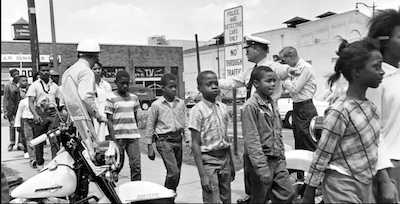
Birmingham Children's Crusade, 1963
What do you do when you want to keep children safe, but their futures depend on exposure to harm? The city of Akron is still reeling from the death of 25-year-old Jayland Walker. Neighbors and visitors alike arrived in droves to support the family and protest. Among them, children not only flitted about the crowds but led chants and marched.
A little boy came up to the supply station I was manning and asked for a bottle of water, having just led the crowd in rallying cries for justice. His eyes lit up when I asked if he'd also like some fruit snacks to go with it. While we were marching, a little girl ran up to me with globs of sunscreen on her face. She asked for my help rubbing it in because her hands were full with her juice box. I did my best to distribute the frankly awesome amount she had smeared across her little cheeks without getting too much in her beaded braids. They stood alongside the organizers, barely coming up to their ribs.
Things started to get uneasy outside of the city council Monday night. Protesters gathered peacefully for public comment as a show of community solidarity. Around 9:00 (two hours before curfew), all entrances and exits were blocked off by barricades and bulldozers. A group of five men with guns and binoculars postured up one rooftop over, monitoring the penned-in community members. People and cars were trapped. Folks were starting to get anxious that the blatant kittling — a police tactic where protesters are surrounded on all sides — would mean that tear gas and riot gear was to come. The city council had just broadcast a citizen’s public comment characterizing the group of people chatting and sitting on lawn chairs outside waiting to participate in a municipal function as an “organized, destructive minority” and a “militia”. As I watched the kids run by in the grass, playing with a tiny dog someone had brought, the cognitive dissonance of hearing those descriptors applied to the group hit my stomach like a stone. A community working towards justice even in its grief was being treated like a dangerous threat.
I had seen some criticisms of children at the protests hearing curse words that are in some of the chants. Because God forbid a child hear a word that appropriately reflects the emotions of the community that is wondering whether Jayland's mother will leave the coffin open so the police can see the young man's face, torn up by their bullets. The children must be protected from naughty words as they march through the streets in the hope that it will prevent them from becoming the next Jayland or Tamir or Breonna. We must not let children hear inappropriate language as they reach for swimming goggles: not to jump in a pool because they're kids and it's summer but because the police were looking a little aggressive and we don't want the 11-year-olds to suffer too much if chemical weapons are deployed.
A community working towards justice even in its grief was being treated like a dangerous threat.
Children are our communities' future. They have always been a part of struggles for justice and civil rights. It's not an option to not put those children in danger because they are already in danger. Little Ruby Bridges is now old enough to have been the grandmother of the children who are marching in Akron. How much has changed? One of the activists described his childhood experience as a third grader being held down to the ground with a police officer's knee to his back while being told he fit the description of a grown man and a threat.
How much has changed? Generations of the community gathered to ask for safety and justice. They were trapped like animals and called a "militia" as the grown-ups watched the playing children much more closely, fearful of their fates.
If the tiny voices of children calling for change are too frightening for the city, I don't even want to imagine what horror the response to that fear would look like. The children are our future. But that's only if they live long enough to become it.
More by Sonder Smith:
A City Cries Out, A County Cracks Down
• • •• • •













